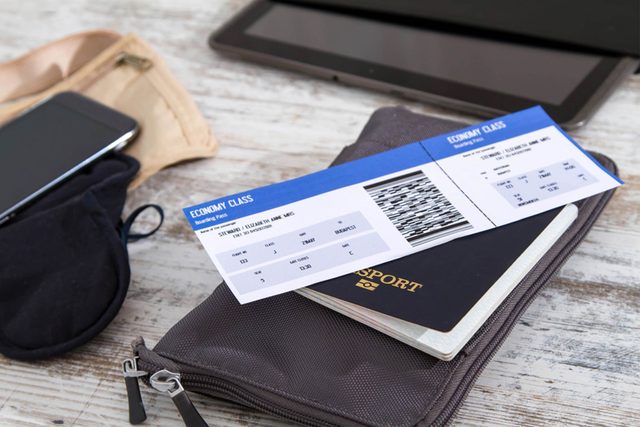Be careful where you leave that printout.
Why You Shouldn’t Throw Out Your Boarding Pass

Let’s fly away
Whether you’re a seasoned traveler or have yet to step foot on an airplane, preparing for and taking a trip is super exciting. But even if you’ve scoured the best air travel tips, found all the airport WiFi passwords you’ll need, and know exactly where your passport and wallet are at all times, you may be overlooking one particular item. It’s essential for air travel, but it can also pose a serious risk to your personal security. Is it those nail scissors you accidentally left in your carry-on? The full-size moisturizer you tried to sneak onto the plane to combat the dry air? (What do airport body scanners see anyway?). Nope. It’s your boarding pass.
Scan = potential scam
You may think of your boarding pass as just the slip of paper that bears your seat number, and you may think nothing of discarding it after your trip. But it has a lot more information on it than you think. Besides your full name and where you’re heading to next (and when!), there’s more personal information that can make you vulnerable to hackers. Most of us don’t realize that Google is keeping track of all our activity, and that our boarding passes have a ton of personal information encoded on them. It all comes down to that one little barcode.
The thing is, airlines aren’t the only ones who can scan the barcode on your boarding pass. It’s very easy to download a scanning app on your phone for free, and that means anyone can scan anyone else’s boarding pass—for example, one left behind on an airplane, or posted on social media—and gain a ton of personal information very easily. Just think about how simple it’s been for you to scan QR codes for menus at bars and restaurants during the pandemic. It’s super easy and contactless. That little barcode makes a lot of your information no more secure than a TSA luggage lock.
The most important piece of info that can be gleaned? Your airline customer account number, which is linked to your frequent flier miles, and possibly other details of your account including your phone number or email address. Any hacker who’s scanned your boarding pass barcode may also be able to see the fare you paid (potentially gaining an idea of your finances), and even the last four numbers of the credit card you used to pay.
How vulnerable is my information?
With your full account number and your name, hackers can find other information about you on social media, including answers to common security questions, such as pet names, or your mother’s maiden name. After they’ve logged into your account, they could change your flights, steal your mileage points, and much more.
And if they can’t get in that way, a bold hacker might even call you up pretending to be the airline. With your full account number and name, why wouldn’t you believe them when they ask for your last password for security reasons? They might even be able to call the airline, armed with the information they’ve stolen—or gleaned from social media (like birth dates), and reset your password that way. Even if you’re flying one of the best airlines, your account could still be vulnerable to attack.
But I don’t have a frequent flier account. Am I safe?
Very few people have accounts with every single airline. If you’re flying with one where you don’t have an account, it seems like your information should be safe. And it might be. But there’s still a risk. With your full name and flight details, a savvy hacker could enter that information on the airline’s website and potentially gain access to all your flight details—and potentially everyone else’s on that flight as well.
So how can I protect my boarding pass data?
Basically, you should treat your boarding pass like you treat your passport or ID. Don’t leave it on the plane, for starters, and shred or tear it up at home before recycling it, instead of tossing it into a public garbage can.
And definitely, definitely don’t post a picture of your boarding pass on Instagram! A boarding pass photo is one of the social media photos you should never post. A quick search for #boardingpass on Instagram reveals thousands of recent posts of users posting a snap of their entire boarding pass, with the barcode entirely unobstructed. If you simply must update your pals on your travels, consider posting your boarding pass pic in your close-friends-only story, or get a mobile boarding pass that’s only on your phone. Even better, take a nice mid-flight picture of the sunset, plane wings, or a landmark from above, and share that instead. Next, learn what things you won’t see in airports anymore.
Sources:
- Forbes.com: “Dangerous Airline Boarding Pass Hacking Trend”
- Komando.com: “Why you should never throw away your boarding pass”























